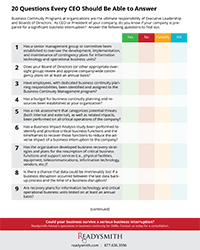

Business Continuity Programs at organizations are the ultimate responsibility of Executive Leadership and Boards of Directors. As CEO or President of your company, do you know if your company is prepared for a significant business interruption? Answer the following questions to find out.
1
Has a senior management group or committee been established to oversee the development, implementation, and maintenance of contingency plans for information technology and operational business units?
2
Does your Board of Directors (or other appropriate oversight group) review and approve company-wide contingency plans on at least an annual basis?
3
Have employees, with dedicated business continuity planning responsibilities, been identified and assigned to the Business Continuity Management program?
4
Has a budget for business continuity planning and resources been established at your organization?
5
Has a risk assessment that categorizes potential threats (both internal and external), as well as related impacts, been performed on all critical operations of the company?
6
Has a Business Impact Analysis study been performed to identify and prioritize critical business functions and the timeframes to recover those functions to reduce the adverse impact of a business interruption to the company?
7
Has the organization developed business recovery strategies and plans for the resumption of critical business functions and support services (i.e., physical facilities, equipment, telecommunications, information technology, vendors, etc.)?
8
Is there a chance that data could be irretrievably lost if a business disruption occurred between the last data backup process and the time of a business disruption?
9
Are recovery plans for information technology and critical operational business units tested on at least an annual basis?
10
Are results of periodic exercising and testing of crisis management, information technology, and operations recovery reported to senior management and the Board of Directors?
11
Has a cyber security plan been developed to detect, respond, and recover from unauthorized intrusions and thefts of the company’s data and information?
12
Do business continuity education and awareness programs exist to ensure that employees are trained to respond to emergency situations and execute business recovery plans if required?
13
Have emergency response teams been formed and trained to carry out procedures and respond to emergency situations?
14
Has a crisis management team been formed to manage incidents and recovery of operations?
15
Has a formal crisis communications strategy and plan been developed to manage crisis related messaging and media (social, public, private) to employees, customers, vendors, stakeholders, etc. during a crisis event?
16
Has a pandemic response plan been developed to guide the company to respond and minimize the effect of pandemic surges impacting employees and customers?
17
Do insurance policies cover losses associated with damaged facilities and equipment, cyber security, extra expense, lost revenue, etc. that may be incurred as a result of a significant disaster event?
18
Are you confident that third party vendors, upon which you rely on for information technology and supply chain services, would recover from a business interruption and have minimal impact on your operation?
19
Have regulators of your industry, consultants or auditors been critical of your organization’s business continuity planning efforts in the past?
20
In the event of a significant business disruption, do you feel certain that the critical components of your organization would be back in operation within * business days?
Could your business survive a serious business interruption?
Take your readiness planning to the next level. Readysmith Advisers specializes in business continuity for SMBs.
Contact us today for a consultation:
877.636.3596 | debra.reddish@readysmith.com

